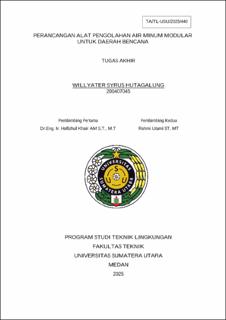| dc.contributor.advisor | Khair, Hafizhul | |
| dc.contributor.advisor | Utami, Rahmi | |
| dc.contributor.author | Hutagalung, Willyater Syrus | |
| dc.date.accessioned | 2025-03-13T05:15:32Z | |
| dc.date.available | 2025-03-13T05:15:32Z | |
| dc.date.issued | 2025 | |
| dc.identifier.uri | https://repositori.usu.ac.id/handle/123456789/102073 | |
| dc.description.abstract | Indonesia is highly vulnerable to natural disasters such as floods, earthquakes, and
tsunamis, with floods being the most frequent disaster in 2022, accounting for 43.1% of
total occurrences. Floods not only cause material damage but also degrade clean water
quality, impact public health, and increase difficulties in water access. In disaster
situations, water distribution systems are often disrupted, making modular water
treatment systems a crucial solution. A modular system enables flexible and efficient
water treatment by utilizing technologies such as manganese sand filtration and activated
carbon. This study aims to design a modular water treatment system to meet the clean
water needs of disaster-affected communities. The design is carried out using the Detailed
Engineering Design (DED) method to ensure the system's technical feasibility while
considering design aspects, operational efficiency, and water treatment effectiveness. | en_US |
| dc.language.iso | id | en_US |
| dc.publisher | Universitas Sumatera Utara | en_US |
| dc.subject | Water Treatment | en_US |
| dc.subject | Modular | en_US |
| dc.subject | Natural Disasters | en_US |
| dc.title | Perancangan Alat Pengolahan Air Minum Modular untuk Daerah Bencana | en_US |
| dc.title.alternative | Design Of A Modular Drinking Water Treatment System for Disaster-Affected Areas | en_US |
| dc.type | Thesis | en_US |
| dc.identifier.nim | NIM200407045 | |
| dc.identifier.nidn | NIDN0012088701 | |
| dc.identifier.nidn | NIDN0020099201 | |
| dc.identifier.kodeprodi | KODEPRODI25201#Teknik Lingkungan | |
| dc.description.pages | 102 Pages | en_US |
| dc.description.type | Skripsi Sarjana | en_US |
| dc.subject.sdgs | SDGs 6. Clean Water And Sanitation | en_US |


